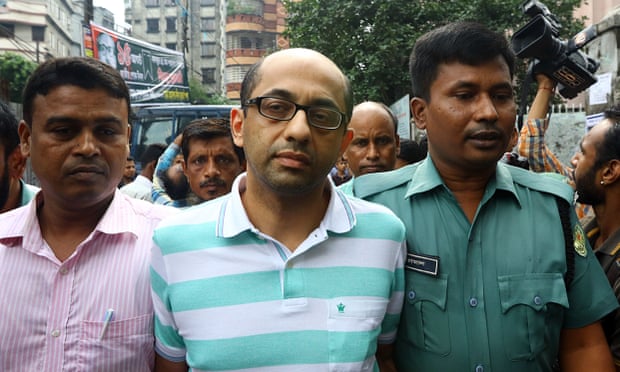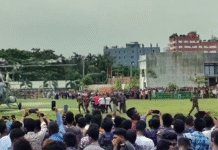
‘Everything’s changed’: despair of Briton held without charge in Bangladesh
Hasnat Karim remains in prison although no evidence has been produced to implicate him in 2016 Holey Bakery attack in which more than 20 were killed
It was supposed to be a celebration. On 1 July 2016, Hasnat Karim, a British-Bangladeshi businessman, and his wife, Sharmina Parveen, took their two children out for their daughter’s 13th birthday at Holey Artisan Bakery Cafe, an upscale Dhaka restaurant. They had gone early so their son could later watch a cartoon at home, where a birthday cake was waiting.
As they scanned the menu, gunmen claiming allegiance to the Islamic State stormed the cafe. Over 10 hours, they murdered more than 20 people, mostly foreigners, and held the others hostage.
Instead, they were caught up in a night of terror that has turned into a year-long ordeal at the hands of Bangladesh’s byzantine justice system, after Karim was accused of involvement in the attack and arrested. The authorities have neither charged him nor produced any evidence that implicates him.
“In one year, everything has changed,” said Parveen during an interview at a Dhaka cafe. Traumatised by the attack, she seldom goes out in public. She has been shunned by friends and colleagues, and lost her job at a local school after parents complained. Her children were suspended for several months.
“My daughter is still really scared,” Parveen said. “Still she thinks that anything can happen if we go out.”
Twice a month, she makes the six-hour drive to and from Kashimpur central jail, where her husband is being held. Conditions are bleak. Karim, who is 48 and has had several stents in his heart, sleeps on the floor and has contracted ear and urinary tract infections. He waited months to see a doctor about his heart. When his father died in November, he was refused permission to attend the burial on security grounds.
Bangladeshi authorities have given few details about Karim’s detention. Initially, police blamed his “behaviour and actions” during the siege, an apparent reference to video and photos showing Karim and 22-year-old Canadian-Bangladeshi student Tahmid Hasib Khan with one of the attackers on the roof of the bakery.
Witness testimonies seen by the Guardian say Karim and Khan were ordered to perform tasks for the militants. Khan, initially accused of “instigating” the attack and charged with withholding information, was released on bail in October and later acquitted.
Bangladesh’s counterterrorism unit could not be reached for comment.
“Authorities have at various points said that Hasnat is being held as a suspect in the Holey Bakery attack,” said Olof Blomqvist, a spokesperson for Amnesty International and the former Bangladesh researcher. “His detention is not only inhumane, it’s also illegal – everyone in detention has the right to be charged with a crime or released under international law.”
Parveen described her husband, a graduate of London’s Queen Mary’s who also studied at Leeds, as a “very shy person” who likes golf and spending time with his children. He chose Holey for the celebrations because they had eaten there before, she said.
During the siege, she, Karim and the other Bangladeshi customers were forced to sit with their heads bowed as attackers shot and hacked to death the non-Muslim diners, including nine Italians, seven Japanese nationals, and an American student, as well as a Bangladeshi Muslim who refused to abandon his friends. A Japanese man who tried to hide in a freezer was dragged out and shot. The militants asked if he was still alive. He said yes. They shot him again.
“They were taking pictures. They were chopping the dead bodies. We could hear all the sounds,” said Parveen.
At around 1am, Parveen added, one of the attackers pointed to her children and asked: “Whose family is this?” When Karim replied, they instructed him to lock the gate to the compound. Parveen thinks they chose him because he would not leave his family.
Then they began serving rice and fish to the surviving Muslim customers, urging them to eat. “You can understand it was not possible to have anything if you are sitting with all the dead bodies around,” said Parveen.
In photos taken by a neighbour, Karim can be seen smoking and talking to Khan and one of the militants. Parveen believes they were sent to the roof to scout for snipers. A report by an intelligence and security firm commissioned by Karim’s family found his “submissive behaviour is consistent with a kidnap victim”.
After the hostages were released and troops stormed the building, killing the militants, Parveen and her children were questioned for two days and then freed, without Karim.
“Two weeks there was no information about him – where they are going, what they are doing,” she says. “They are saying they don’t have my husband with them.” After a month, they announced that he had been arrested.
The arrest fits into a pattern of disappearances and secret detentions carried out by Bangladeshi authorities with increasing frequency in the wake of the terror threat, according to human rights groups. Blomqvist said the secret detention of Hasnat “speaks volumes about the Bangladeshi authorities’ willingness to run roughshod over the rule of law”.
But few in Dhaka have come to Karim’s defence. Until recently, his family was unable to find a lawyer willing to take on the case. “Some say very complicated things about terrorism,” Parveen told the Guardian. “‘The situation is not in our favour.’ ‘We can’t help you.’”
Even local activists have been reluctant to speak out. “Who’s going to come and say this is a human rights issue unless they have solid evidence he did not do it?” said Imtiaz Ahmed, professor of international relations at Dhaka University. Those who stand up for him “can end up in some bad situation”, Ahmed added.
The British high commission in Dhaka pushed for Karim’s visit to a doctor about his heart in July. But because he is a dual citizen, it says its influence is limited, according to Parveen. She said FCO officials did not respond to the family’s request for a meeting with senior staff.
“Our staff have remained in contact with the family of a British-Bangladeshi dual national since his arrest in Bangladesh in 2016,” an FCO spokesperson told the Guardian. “We have visited him since his detention to offer consular assistance and check his welfare.”
Parveen struggles to stay optimistic for their children. Sometimes she tells them: “Your Daddy will come back soon.”
Her daughter recently turned 14. It was a subdued celebration, a year to the day of the attack. “I didn’t call her class friends, you understand,” said Parveen. “Because I thought: ‘Would they really like to come?’”
The Article appeared in the Guardian on 24/09/2017









